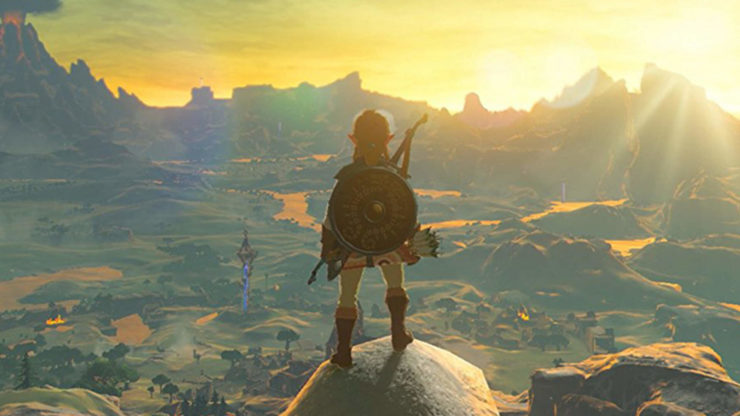* I am not actually good at life.
I was ready to fight Calamity Ganon. I had my Master Sword. I had the power of all four Divine Beasts and their ghostly masters on my side. I had a full inventory of restorative homecooked meals. This was the beginning of the end. It was now or never.
So I stopped, paused the game, and went on the internet to look up how to use my shield.
I’d made it through the entire game—probably some hundred hours of playtime—without ever using a shield after a few early skill-acquisition trials. Not on purpose, mind you. I occasionally thought it would be very nice to be able to block enemy blows in battle. I just couldn’t ever remember which button to push. I did a lot of desperate sword-smashing and running away instead.
I am so bad at The Legend of Zelda: Breath of the Wild. And you know what? It’s great.
Breath of the Wild (BotW) came out five years ago. You likely know what it is. Everybody knows what it is. It’s been hailed as one of the best games ever made, with critics and players spilling endless virtual ink gushing over its open-world design. People love it! They lament how it ruined them for other video games. Or praise how it taught them important things about their relationship. Or got them through the early days of the pandemic. Some guy is building the entire map in Minecraft.
It’s a great game, and I’m pretty bad at it. I somehow manage to be pretty bad at it in spite of having watched a friend play it all the way through before I played it myself. I even named my cat Link, but that didn’t help me. I have beat the game, but I still don’t know which button to press to use a shield. I managed maybe half of the side quests, mostly because I kept running away from children who wanted me to run errands or source cooking ingredients for them. And so many men want me to race them? Why? Go race somebody else. I once died seven times in three minutes by getting repeatedly struck by lightning. Another time an ostrich head-butted me off the side of a mountain and into a lake of molten lava—then it happened again, headfirst into a different lake of molten lava. (I don’t know if it was a different ostrich.) I fell off so many cliffs because it started raining while I was climbing. I ran away from every single Lynel I saw; I beat the entire game without ever properly fighting one of those fuckers. Once I set myself on fire trying to cut down a tree.
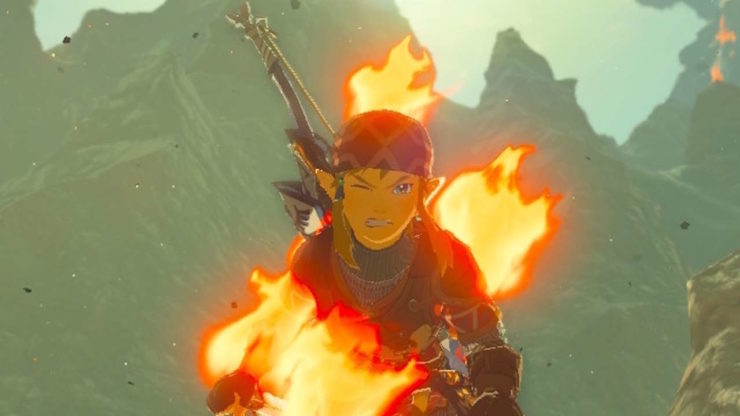
I want to make something clear: BotW is not a difficult game.
Small children play it with little to no difficulty. Nintendo even released DLC that gives you the option of making the game harder, because people thought it was too easy. I’m not bad at it because it’s difficult. I’m bad at it because I play video games to look at pretty imaginary scenery and smash things with swords and escape the crushing bleakness of daily life in our disintegrating late capitalist hellscape, and I only sometimes remember that there is technically a goal involved that I could be playing toward.
And, maybe, another reason. See, I have a theory about this game in particular.
My theory is that being bad at Breath of the Wild is the entire point of Breath of the Wild.
Maybe being bad at Breath of the Wild can teach us a lot about storytelling—which means that it can also tell us something about life, because how we think about stories is inextricably linked to how we think about life.
The ostensible purpose of the game is to defeat an ancient evil known as Ganon, release the land of Hyrule from its slimy purple clutches, and free Princess Zelda from where she’s been single-handedly protecting the kingdom in dire combat for one hundred years. You, playing as Link, wake up in a cave and wander around for a while learning the game mechanics. A strange old man gives you a hang-glider and tells you to go save the day.
At that point you could, I guess, head off to save the day.
Or you could do whatever the hell you want instead.
It’s very difficult to focus on saving the world in BotW, because the world you’re supposed to be saving is just too much fun to explore. It’s this beautiful, pastoral post-apocalyptic landscape full of greenery and wildlife, monsters and treasures, oceans and mountains, ruined castles and thriving villages. There’s an entire town full of fearsome warrior women. Sometimes rocks come alive and try to kill you. You can ride horses around and keep them as your own and name them after your sisters’ cats. Some evildoers turn into bananas when they die. You can collect an unlimited number of cooking ingredients and spend as much time as you want mixing up recipes by campfires. Everywhere you go, travelers and small children ask you for favors. There are 900 little leaf-people hidden around the world that will give you seeds if you find them: under rocks, in trees, in ponds, atop mountains. You need to find some of these seeds to expand your weapons inventory slots, but you certainly don’t need to find 900. Unless you want to. All the little leaf-men have the same laugh. Find a bunch of them in a row and you’ll hear that laugh in your dreams.
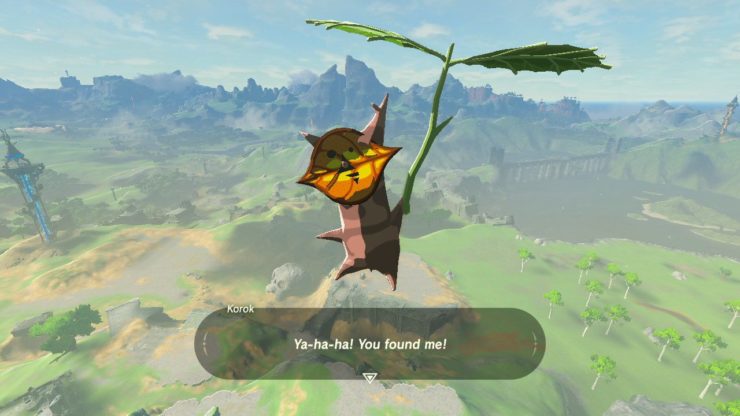
That’s not to say there is no story-related guidance. There is. It’s just very easy to ignore. So ignore it I did, until I happened to stumble upon a strapping fish prince or traumatic memory that put me back on the main quest, which always lasted only as long as it took for me to get distracted again. Why does that child want me to swim downriver with their letter? Who the hell knows. Guess I’ll find out.
This is, of course, the defining feature of true open-world games. What’s the point of all those lovingly rendered landscapes and painstakingly detailed locations if you don’t get lost on your way to every battle and accidentally find yourself at the opposite side of the map with only the vaguest memory of what you had set out to do? The lack of rigidity, the immersion, the freedom, those are all what make open-world games fun to explore.
At some point between getting struck by lightning seven times in a row and going into the final battle without knowing how to use a shield, I started to wonder if people speedrun BotW. Of course they do; gamers speedrun everything. There are a few different types of speedruns: defeating Ganon only, defeating Ganon and all the other major bosses, finishing all the shrines, completing 100% of the game, riding every rideable creature up to and including your fish-prince boyfriend, etc. The first kind exploits a bug in the game that lets you fly across the landscape; the current record is just under 24 minutes. But I am more interested in the 100% speedruns: every boss, every shrine, every key item, every weapon and clothing upgrade, every side quest, all 900 Korok seeds. The current record is around 15 hours.
I think it took me about 15 hours of play time just to figure out how to sneak up on that stupid stag you have to ride to find that one shrine next to the accordion-playing bird man.
Now, I know—because I know the internet, and I know gamers—that there are people reading this who are just dying to tell me how to do it better. Before you set your keyboards afire with advice on how to ride that stupid stag in five minutes, consider this: I don’t care.
Because the number one driving force behind the way I play BotW is not narrative momentum, nor a desire for any sense of achievement, but curiosity.
This is one of the genuine joys of playing BotW. No matter what you set out to do, you will always be distracted by spotting something on the horizon or on the map and thinking, “Huh. I wonder what’s over there?” Why is that mountain glowing? What happens if you roll this giant snowball down this hill? What happens when you mix monster guts with cane sugar and crab legs? Will that lost traveler turn into an evil banana cultist when you fight them? Can you ride a bear? How far can you soar if you climb the highest mountain and jump off?
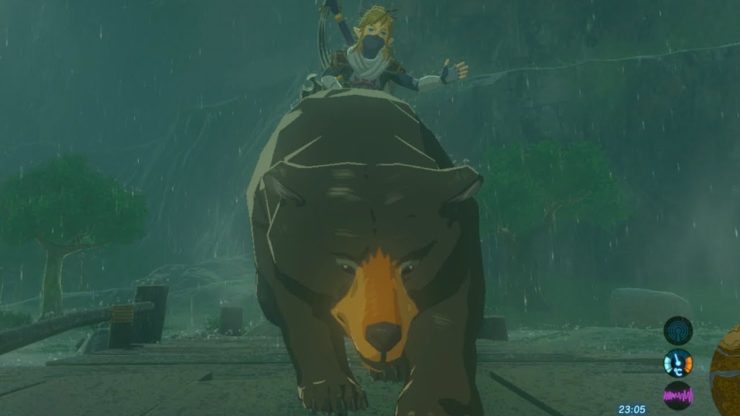
The practice of indulging in curiosity is one that holds an odd place in how we, as human adults, think about our world and ourselves. I think most people recognize the value of it in some general sense: we want children to play, we want scientists to experiment, we want to try new things. At the same time, on a very practical level, there is sometimes quite a lot of dismissal, or even scorn, for indulging in curiosity for its own sake. People talk about falling down a Wikipedia rabbit hole looking up names for clouds and realizing seven hours later they’re deep in an article about troop movements in the Franco-Prussian War, and it’s so often framed as a failure of focus, a neurosis that must be pathologized and explained away, rather than a sign that, perhaps, the world is full of interesting things to learn, and sometimes it’s fun and engaging to go learn about them with no particular goal in mind. We often define activities by an intended result, not by the activity itself: Learning random facts on the internet is research; children’s playtime is educational; taking a ramble through the woods is healthy; a new hobby is productive—or, even worse, potentially profitable.
Of course, all of these activities can be those things. Kids do learn by playing. Walking in nature is good for us. And, yes, sometimes seven hours on Wikipedia is a sign of a problem that needs to be addressed. Human are complicated animals; many things can be true at the same time.
What interests me, however, is how this framework of defining activities by their outcome has infected the way we create, experience, and talk about stories and art.
Buy the Book
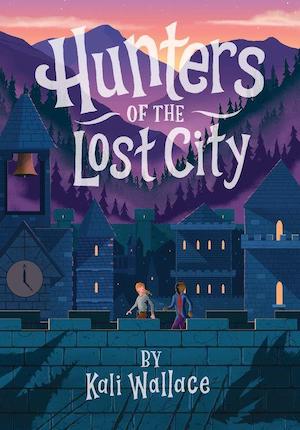

Hunters of the Lost City
It’s a common complaint among bookish circles that it’s much easier, these days, to learn a book’s list of character types, tropes, and the relative happiness of its ending than it is to learn anything that actually tells us what the book is about. The function of this approach is easy to understand: People want to know what they are getting into, and other people want to provide that information. Nobody wants to waste their time (or money) on something they won’t enjoy.
And I get that. I really do. Life is short, none of us can pay our rent, and we all want to read and watch and play things that we’re going to like.
At the same time, I find such rigorously goal-oriented approaches to stories and art frustrating, even a little sad. As a writer, it’s distressing. For me the absolute joy of writing comes from having a creative process best described by the creepy boat scene in Willy Wonka and the Chocolate Factory (1971): hurtling into a dark cavern while chanting, “There is no earthly way of knowing in which direction we are going!” And now you want an itemized list of tropes before I even write it? You want me to know how a book will make readers feel before they read it? You want me to know how a BookTok reviewer who wasn’t even born when I started writing this book will describe it when it’s finished? Did you just call my book content? Please don’t. Help. This is my worst nightmare.
So there is an element of very personal, very visceral recoil in my reaction to the idea that stories exist to reach goals. But there is also good dose of dissatisfaction as a reader and viewer and game-player—a person who enjoys experiencing stories in many different forms. I love going into a story without knowing where it’s headed or how it’s going to end. I like to be surprised—and that remains true even when some surprises are disappointments, and some stories are not remotely to my taste. So when we the experience of stories is reduced to a checklist of familiar beats along the way toward a known ending, it feels to me, an awful lot like that 24-minute BotW speedrun, in that it reaches the goal by skipping over everything thing that’s interesting about the game.
I’m not saying that stories should be written like open-world video games; different media are suited to different kinds of stories. And I’m certainly not saying that stories should be written like BotW, and definitely not how I play BotW. (Although more characters in every genre could stand to be headbutted into fiery lakes of lava by disgruntled ostriches.) But playing BotW, and playing it badly, gave me a lot of time to think about why I was enjoying it so much even when I was making no discernible progress. Why I felt no sense of achievement when I won the game, only disappointment that it was over.
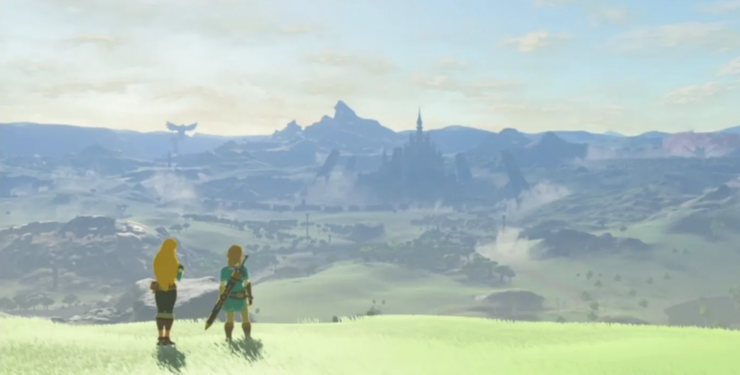
We live in a world that is obsessed with levelling up. Everything is a ladder: careers, relationships, families, hobbies. Young people seem to have more anxiety than ever about aging, as arbitrary numbers represent points of success or failure. College-career-marriage-house-kids. Recent years have revealed more and more of the rot in the rungs of the life paths we’re supposed to want to follow, but there is still pressure to follow predetermined narratives.
The creation of art is not immune. Set out on any particular creative endeavor and you’re inundated with advice on how to learn it faster, in fewer steps, with less trouble. Finish more efficiently. Become an expert. Make a career out of it. In fiction publishing, prolific is often treated as synonymous with skilled or successful, which is a whole big can of worms to dig into. But I understand it. I’m a professional writer; we have to adapt to survive, regardless of how unhappy we are with what the world demands of our art.
But I wonder about what’s being lost, for both storytellers and audiences, when the stories themselves, and our experience of them, succumbs to the same kinds of pressures that fills our lives with so much relentless stress. Know where you’re going. Identify every step. Get there as fast as possible. Never waste a moment. Check it off the list. Package your content. Tell the world. Move on. Repeat. Repeat. Repeat.
Is that really what we want every story to be? Of course not. I am absolutely certain of that. I know I’m not the only one who loves a ramble through a monster-filled forest, a bit of unpredictable playfulness, a chance to get lost in the tale without knowing the way out. I don’t want stories that offer such an experience to fall out of style simply because it’s momentarily en vogue to strip everything down to a checklist of marketable tropes and assured experiences. It’s such a cliché, but it never hurts to remember that in storytelling, as in life, the journey really is more important than the destination.
Maybe we could all stand to be a little more comfortable with wasting a bit of our time. I think we might like it, in the long run.
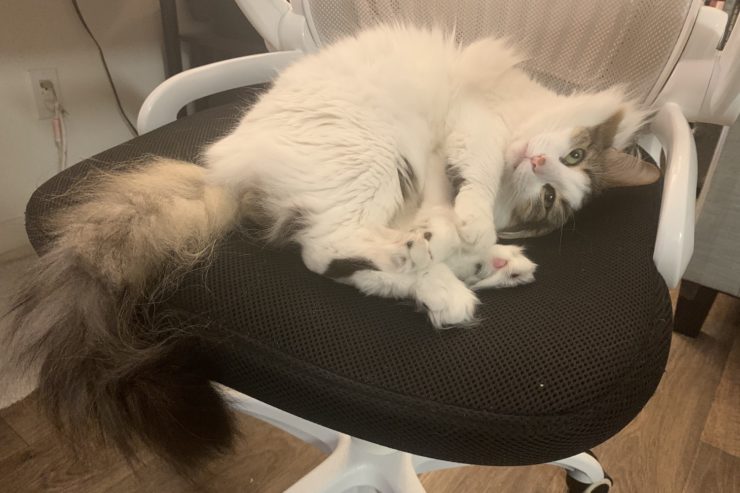
Kali Wallace studied geology and earned a PhD in geophysics before she realized she enjoyed inventing imaginary worlds more than she liked researching the real one. She is the author of science fiction, fantasy, and horror novels for children, teens, and adults, including the 2022 Philip K. Dick Award winner Dead Space. Her short fiction has appeared in Clarkesworld, F&SF, Asimov’s, Tor.com, and other speculative fiction magazines. Her newest novel is Hunters of the Lost City, a middle grade fantasy adventure out now from Quirk Books. Find her newsletter at kaliwallace.substack.com.










